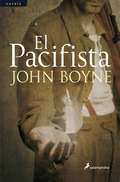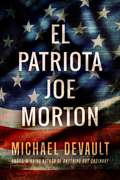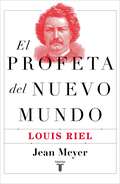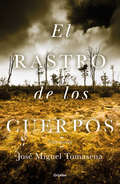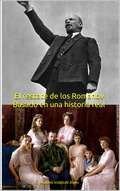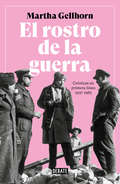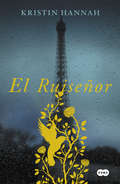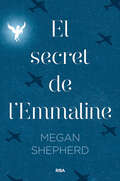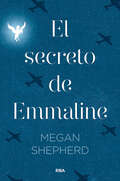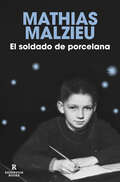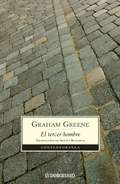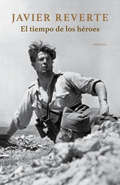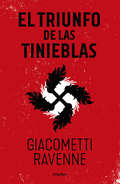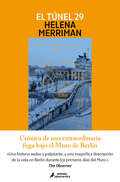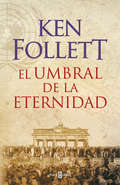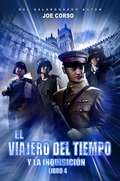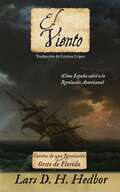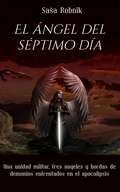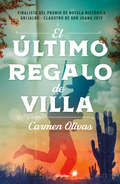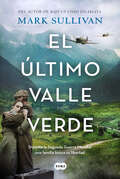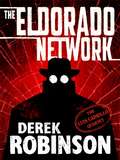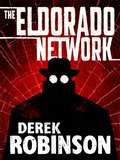- Table View
- List View
El pacifista
by John BoyneJohn Boyne maneja los hilos del relato con gran destreza, hasta alcanzar un desenlace impactante, de los que permanecen en el recuerdo. Septiembre de 1919. Tristan Sadler, de veintiún años, coge un tren de Londres a Norwich para devolverle a Marian Bancroft las cartas que ésta escribió a su difunto hermano, Will, durante la Gran Guerra. Will y Tristan tuvieron una relación íntima, pero las cartas son sólo el pretexto de la visita. En realidad, Tristan guarda un doloroso secreto en lo más hondo de su ser, un secreto que está dispuesto a compartir con la hermana de su amigo, si finalmente consigue reunir el valor necesario. El pacifista es una novela de heroísmo, amor y traición en el universo moralmente nebuloso de la guerra. En un entorno donde imperan la crueldad y la sinrazón, dos jovencísimos soldados libran una amarga batalla contra la complejidad de sus emociones. Su amistad, primero en el campo de instrucción ydespués en las trincheras del norte de Francia, trae consigo la intensa luz del autoconocimiento y la felicidad, pero también las tinieblas del desconcierto y el dolor. La crítica ha dicho...«Una novela de una profunda melancolía [...]. John Boyne es muy, muy bueno en su retrato del poder destructivo de un secreto dolorosamente guardado.»John Irving «Una novela que se interroga con crudeza no sólo sobre qué significa ser hombre sino qué significa ser una persona en las circunstancias extremas de la guerra.»The Irish Times «Impactante, emotiva y hermosamente escrita. Se convertirá en un clásico de las novelas sobre la guerra.»The Bookseller «La deshonra y la culpa son dos enormes sombras en este libro, en el que Boyne conecta la deshonra sexual con la deshonra moral y la deshonra social.»Irish Independent
El patriota Joe Morton
by Susana González Tuya Michael DevaultCuando los habitantes de la pequeña población de Cranston, Texas, se enteran que uno de los chicos del pueblo ha muerto en Iraq se ponen manos a la obra para preparar un funeral como dios manda para su héroe fallecido. Sin embargo, nadie piensa en preguntarle al padre del chico, Joe Morton, una persona solitaria, si ese es el tipo de funeral que desea. Destrozado por el duelo, Joe les sigue la corriente hasta que ya no puede más, y el 4 de julio les dice exactamente lo que piensa. Este acto de independencia trae consigo consecuencias inesperadas y devastadoras. Ni los vecinos, ni mucho menos Joe Morton, están preparados para lo que ocurre a continuación: el cambio y el mundo exterior llegan a Cranston. Finalista del premio Medalla de Oro Pirate’s Alley Faulkner, El patriota Joe Morton ilustra el alto precio que conllevan las conjeturas.
El profeta del nuevo mundo: Louis Riel
by Jean Meyer«La voz de todos los susurros de la conciencia canadiense, el símbolo de una composición étnica abigarrada» Héroe, traidor, asesino, hereje, mártir, loco, noble salvaje, agente del imperialismo yanqui, defensor de los derechos de los mestizos y de los indios, padre de la provincia de Manitoba e, incluso, uno de los fundadores de la Confederación Canadiense. La Historia quiso que epítetos tan diversos y discordantes correspondan a un mismo individuo: Louis Riel. La vida y muerte de este personaje se han convertido en mitos fundacionales de Canadá. Louis Riel fue líder del pueblo métis —etnia mestiza, de ascendencia indígena y europea— que encabezó dos movimientos de resistencia contra el gobierno canadiense. El primero (1869-1870) dio como resultado la creación de la provincia de Manitoba, y el segundo (1885) derivó en un enfrentamiento militar, la única guerra que ha tenido lugar hasta la fecha en suelo canadiense. Este conflicto, alentado por sir John Macdonald, primer ministro de Canadá, además de costarle la vida a Louis Riel, les valió a los indios su encierro en las reservas por más de sesenta años y cuyas consecuencias vemos hasta ahora. Sobre ninguna otra figura de la historia de Canadá se ha escrito tanto como sobre Louis Riel, sin embargo, ésta es la primera biografía en español. Resultado de una labor de investigación de cincuenta años, El profeta del Nuevo Mundo nos revela la vida de un hombre que quiso hacer de Canadá un espacio de comunión para las naciones.
El rastro de los cuerpos: Una novela
by José Miguel TomasenaCon maestría y un claro juego de espejos, José Miguel Tomasena hace un retrato de la impunidad y la violencia desde el punto de vista de las víctimas. Cuando el diario en el que trabajaba entra en crisis, la periodista Tania Vázquez decide filmar por su cuenta un documental sobre los desaparecidos. Así conoce, entre muchas personas, a Doña Gaby, cuya hija Marilyn fue secuestrada previo pago de un rescate de cien mil pesos, y a Magdalena Chávez, que perdió a sus tres hijos y que decide embarcarse en una aventura para conocer su paradero. Estas dos madres, más todos aquellos padres que buscan a sus seres queridos en morgues, cuarteles, hospitales y fosas clandestinas, serán los personajes que iremos construyendo a través de mirar las grabaciones y de la voz del novio de Tania; sin embargo, documentar la lucha de estas mujeres tendrá consecuencias que jamás habrían podido prever... Con maestría y un claro juego de espejos, José Miguel Tomasena hace un retrato de la impunidad y la violencia desde el punto de vista de las víctimas, sean residentes en las regiones asoladas por el narcotráfico que sufren de la persecución cotidiana, o los periodistas acosados por los caciques locales para que no investiguen sobre desapariciones que prefieren dejar en el olvido; pero también es una novela sobre el amor a los hijos, sobre la esperanza de poder hacer un cambio y los deseos de justicia. «¿Dónde están los desaparecidos?, se preguntan los que se quedan, los sobrevivientes, pero sobre todo se atormentan pensando qué pudieron haber hecho, en qué fallaron, si es que hubo alguna posibilidad de salvación, de que la historia fuera distinta. El rastro de los cuerpos es el relato descarnado de estas pérdidas, una exploración ética y moral sobre la culpa y la responsabilidad, sobre el sentido del heroísmo y su peligrosa vecindad con la temeridad. Una magnífica novela que ojalá algún día podamos leer como un thriller, como una estupenda novela policiaca o de suspenso, en un futuro de paz, cuando hayamos superado la epidemia de violencia que asola al país». Juan Pablo Villalobos, autor de Fiesta en la madriguera
El regreso (Bestseller/debolsillo Ser. #Vol. 188)
by Rosamunde PilcherEl regreso es una verdadera obra maestra. Estamos en 1935. Judith Dunbar, una chica de catorce años, es acogida por una familia muy especial que marcará significativamente su adolescencia. La suntuosa casa de campo que los Carey-Lewis poseen en Cornualles, idílica región del sudoeste de Inglaterra, se convierte en su segundo hogar. Sin embargo, turbada por el despertar de su propia sexualidad y tras una frustrante relación amorosa con Edward, el hijo mayor de la familia, Judith decide hacerse dueña de su propio destino. Lejos de allí, los vientos de guerra que se ciernen sobre Europa se desatan repentinamente. Judith está dispuesta a colaborar en la lucha contra el nazismo, lucha que le toca muy de cerca. Su padre cae prisionero de los japoneses, su madre desaparece, Edward es arrastrado por los acontecimientos... La vida de Judith parece hundirse en un infierno de locura y barbarie. Pero en medio del caos, surgirá alguien que siempre ha estado a su lado, aunque ella no lo supiera.
El rescate de los Romanov: Basado en una historia real
by Waldon Volpiceli AlvesRusia 1917. El zar Nicolás II renuncia. Lo que ha sido poco divulgado es que él intentó huir a Inglaterra, pero su entrada fue negada, aunque el rey Jorge lo quiso recibir. Cuando Lenin asumió el poder, Nicolás II fue transferido a Ekaterimburgo, una ciudad más lejana. Allá, él quedó prisionero junto con su familia y algunos empleados leales a él, esperando su destino. Allá ellos fueron asesinados en 1918. Lo que poca gente sabe es que el servicio secreto británico, a través de un espía llamado Steve Allen, planeó detalladamente un rescate osado de todos ellos. El intento de rescate nunca pasó, ¿pero si hubiera sucedido? ¿Cómo podría haber sido? Este libro de ficción intenta responder a esta pregunta, basado en los planes de rescate revelados. ¿Por qué la entrada de Nicolás II fue negada en Inglaterra? ¿Como Alemania apoyó a Lenin y a la Revolución Rusa? ¿Cómo la familia Romanov fue asesinada? Todo esto en este libro. Basado en hechos reales.
El rostro de la guerra: Crónicas en primera línea 1937-1985
by Martha GellhornLas crónicas de la mítica corresponsal Martha Gellhorn, desde la guerra civil española hasta los conflictos de Centroamérica de los años noventa. Martha Gellhorn, periodista y escritora estadounidense, vivió como corresponsal de guerra los conflictos bélicos más importantes de la segunda mitad del siglo XX. Este libro recoge los sentimientos, las impresiones y el testimonio directo de Gellhorn en la Guerra Civil española, las guerras de Finlandia, de China, la Segunda Guerra Mundial, la guerra de Java, las guerras y conflictos en Oriente Próximo, Centroamérica y Vietnam. «Escribí muy deprisa [...] -diría Gellhorn-, siempre temía olvidar el sonido, el olor, las palabras, los gestos exactos que eran propios de ese momento y ese lugar». Los reportajes aquí reunidos se muestran como un reflejo de esos intensos momentos. Recuentos sinceros que revelan laprofunda empatíade una mujer que supo comprenderla vulnerabilidad del ser humano y transmitirla en sus crónicas. Acompañados al final de una serie de textos escritos por la autora con la perspectiva que da el paso del tiempo y de una visión general propia que refleja su actitud contra las armas nucleares y su amenaza de la guerra, las crónicas de Martha Gellhorn son un clásico en su género y han creado escuela en todo el mundo. Críticas:«Un brillante libro anti-guerra.»The New York Times «El estilo de Gellhorn es simplemente fascinante.»The Guardian «Una colección excepcional de crónicas punzantes pero compasivas de la tragedia y el sufrimiento de la guerra.»Library Thing
El ruiseñor
by Kristin HannahDos hermanas buscan su propio camino hacia la supervivencia, el amor y la libertad en la Francia ocupada durante la Segunda Guerra Mundial. 50 semanas en el TOP10 del New York TimesMás de 1.500.000 de ejemplares vendidos de ejemplares vendidosUno de los 10 libros más vendidos en USA en 2015Premio Goodreads Mejor Novela de Ficción Histórica Francia, 1939. En el tranquilo pueblo de Carriveau, Vianne Mauriac se despide de su marido, Antoine, que debe marchar al frente. Ella no cree que los nazis vayan a invadir Francia, pero lo hacen, con batallones de soldados marchando por las calles, con caravanas de camiones y tanques, con aviones que llenan los cielos y lanzan bombas sobre los inocentes. Cuando un capitán alemán requisa la casa de Vianne, ella y su hija deben convivir con el enemigo o arriesgarse a perderlo todo. Sin comida ni dinero ni esperanza,Vianne se ve obligada a tomar decisiones cada vez más difíciles para sobrevivir. La hermana de Vianne, Isabelle, es una joven rebelde de dieciocho años que busca un propósito para su vida con toda la temeraria pasión de la juventud. Mientras miles de parisinos escapan de la ciudad ante la inminente llegada de los alemanes, Isabelle se encuentra con Gaëton, un partisano que cree que los franceses pueden luchar contra los nazis desde dentro de Francia. Isabelle se enamora completamente pero, tras sentirse traicionada, decide unirse a la Resistencia. Sin detenerse nunca para mirar atrás, Isabelle arriesgará su vida una y otra vez para salvar a otros. En el amor descubrimos quiénes queremos ser.En la guerra descubrimos quiénes somos en realidad. «Me entusiasmó El ruiseñor de Kristin Hannah, una escritora con gran talento para crear historias con magníficos personajes, excelentes argumentos y fuertes emociones. ¿Se puede pedir más en una novela?»Isabel Allende Reseñas:«Un libro que no se puede dejar... Este homenaje emocionante y emocional a las valientes mujeres que lucharon tras las líneas enemigas en la Segunda Guerra Mundial está destinado a conseguir para la ya inmensamente popular Hannah una audiencia todavía mayor. El Ruiseñor lo tiene todo para arrasar en el mundo editorial.»Booklist «Una novela llena de emoción y corazón.»Library Journal «El Ruiseñor es una exploración hermosamente escrita y enormemente evocadora de la vida, el amor y los estragos de la guerra, y de las diversas maneras en que las personas reaccionan ante situaciones inimaginables. Esta poderosa historia está repleta a partes iguales de acción y emoción, y está garantizado que será un gran éxito. ¡Me encantó!»Sara Gruen, autora del best seller Agua para elefantes «Hannah trata con maestría el drama de la guerra a través de dos mujeres cuya fuerza de carácter brilla más allá de sus diferencias.»Publishers Weekly
El secret de l'Emmaline
by Megan ShepherdNomés la mirada d’un nen pot combatre la foscor. «Em dic Emmaline i tinc un secret. No l’explicaré a ningú, ni a en Benny, ni a l’Anna, ni tan sols a la germana Constance. El meu secret s’amaga als miralls que reflecteixen les elegants estances que en una altra època van ser la llar d’una princesa bonica i que avui habitem nosaltres. Però a tu sí que te l’explicaré: hi ha cavalls alats que viuen als miralls de l’hospital de Briar Hill.» Desembre del 1941. El bombardejos alemanys assolen les ciutats d’Anglaterra i molts nens són evacuats al camp. Els més malalts i traumatitzats són traslladats a hospitals especials. L’Emmaline és una d’aquestes nenes. Però ella és diferent, ja que té una cosa que no tenen els altres. Un secret que li permetrà trobar el color en un món gris.
El secreto de Emmaline
by Megan ShepherdMe llamo Emmaliney tengo un secreto... Una historia de amor, amistad y fantasía que te invita a soñar.Una lectura inolvidable. Diciembre de 1941. Los bombardeos alemanes asolan las ciudades de Inglaterra y muchos niños son evacuados a la campiña. Los más enfermos y traumatizados son trasladados a hospitales especiales. Emmaline es una de esas niñas. Pero ella es diferente, ya que posee algo de lo que carecen los demás. Un secreto que le permitirá encontrar el color en un mundo gris, porque... solo la mirada de un niño puede combatir la oscuridad.
El soldado de porcelana
by Mathias MalzieuCon la conmovedora historia de Mainou, Mathias Malzieu ha conquistado de nuevo a los lectores franceses, firmando una novela aclamada unánimemente por la crítica de su país. «Con pudor y emoción, Malzieu se pone en la piel de su propio padre, su soldado de porcelana, en esta novela divertida y tierna, sensible y melancólica, que suena siempre a verdad».Livres Hebdo Francia, verano de 1944. Con nueve años, Mainou acaba de perder a su madre mientras daba a luz a su hermana pequeña. El compungido padre se ve obligado entonces a enviar a Mainou a Lorena, con su abuela, al otro lado de la línea de demarcación, escondido en un carro de heno. Allí, en la granja familiar, tratará de retener los últimos suspiros de su infancia mientras la realidad lo empuja a evadirse: el miedo, la pena, la guerra. Junto a esa familia que aún no conocía, y a los misteriosos sucesos que los rodean, el niño se confía a la imaginación para atravesar el duelo y sobrevivir a los últimos meses de la Segunda Guerra Mundial. Con El soldado de porcelana, Mathias Malzieu le ha escrito una carta de amor a su padre que es a la vez un homenaje universal, una novela que narra los acontecimientos de su vida con la honestidad exacta para situarnos a la altura de los años cruciales, cuando todo está por definir. La crítica ha dicho:«Como suele ocurrir con Mathias Malzieu, los fantasmas no llevan sábanas blancas: son solamente recuerdos que aguardan para perseguirnos [...]. Una historia íntima y conmovedora».Le Figaro «Mathias Malzieu no escribe bien, escribe en estado de gracia; es como si fuera un niño crecido que ha hecho un pacto ateo con las estrellas. Sabe ver el polvo de lossueños que se esparce por el mundo y que revela, de manera casi fotográfica, la poesía de cada momento».Le Journal du Dimange «Una novela cariñosa e irresistible sobre la infancia de su padre. [...] Mathias Malzieu tiene el don de transformar las cosas serias en burbujas de poesía».Elle«Una historia que sabe proporcionarnos una alegría en cada página con sus expresiones revoltosas que parecen hilvanadas en el aire. ¡Y qué retrato lúdico de la infancia!»Le Parisien «El mundo de la infancia se evoca en estas páginas con una modestia abrumadora.[...] Páginas límpidas, inteligentes y sutiles».Le Provence«Mathias Malzieu [es] un mago de la narración. [...] Su arte consiste en contar una historia tierna poniéndose en la piel de un niño. Entre la delicadez y la poesía, nos convertimos en ese niño con un gran corazón. Encontramos aquí la esencia de Mecánica del corazón que tanto nos enamoró en su momento».Le Soir «lanovela más íntima de Mathias Malzieu, que combina el humor y la poesía para rememorar la infancia de su padre».Tandem «Una hermosa novela».Midi Libre «Sensible y precisa [...]. Mathias Malzieu, el travieso, ha encontrado el tono adecuado mezclando un humor desenfadado con imágenes oníricas».La Libre Belgique (Bélgica)«La guerra vista desde el punto de vista de un niño, descrita con una escritura poética: esta novela es de una belleza deslumbrante».Ciné Télé Revue (Bélgica) «Una verdadera oda a la perseverancia y al amor»La Côte (Suiza) «Un homenaje conmovedor. [...] Es un placer descubrir a Mathias Malzieu en este nuevo registro».Metro (Bélgica)
El tercer hombre (Biblioteca De Graham Ser.)
by Graham GreeneUna de las novelas más importantes del autor, que gozó de una genialadaptación cinematográfica, dirigida por Carol Reed y protagonizada porOrson Welles y Joseph Cotten. Una historia sobre la amistad, la traicióny el desengaño. Poco después de la Segunda Guerra Mundial, Rollo Martins, un escritor desegunda fila, recibe una carta desde Viena de su amigo Harry Lime paraque vaya allí a escribir unos artículos periodísticos sobre la ocupaciónde los aliados. Cuando llega a la ciudad, Rollo se entera de que suamigo ha muerto.El protagonista empieza a investigar y entonces descubre que Harryocultaba secretos muy sucios y que del chico que conoció en suadolescencia apenas quedaba ya nada.
El tiempo de los héroes
by Javier ReverteLa biografía novelada de Juan Modesto, uno de los jefes de las milicias comunistas, recoge toda la épica y la tragedia de la Guerra Civil española. Una de las mejores historias escritas sobre el conflicto. Por Javier Reverte. Marzo de 1939. A punto de caer Madrid y tras las derrotas del río Ebro y Cataluña, el ejército republicano se desploma mientras las tropas franquistas avanzan hacia Levante, a la conquista de los últimos bastiones de la Segunda República. En el pueblo de Petrel (Alicante), el gobierno de Juan Negrín y buena parte de los dirigentes del Partido Comunista preparan su salida de España. Y hasta allí llega el general Juan Modesto para organizar, junto con otros jefes militares republicanos, la evacuación del gobierno. Son los últimos días de la guerra y los recuerdos se agolpan en la mente de Modesto. Por su memoria desfilan los días de su infancia, las alegres jornadas del Madrid que resistía el avance del fascismo, sus amores, los combates del Quinto Regimiento y de las Brigadas Internacionales, todas las batallas que le convertirían en una leyenda: el Jarama, Brunete, Belchite, Teruel, el Ebro, Cataluña... El Juan Modesto de la realidad histórica se convierte, en esta novela, en un personaje que alcanza la dimensión de los guerreros de antaño, de los héroes clásicos.
El triunfo de las tinieblas (Trilogía Sol negro #Volumen 1)
by Jacques Ravenne Eric GiacomettiLos nazis recorren el mundo en busca de cuatro reliquias que convertirán el Tercer Reich en un poder milenario. El eterno combate entre el Bien y el Mal. Tíbet, enero de 1939. Una expedición de las SS se apodera de una esvástica tallada en un metal desconocido. Es una de las reliquias que simbolizan los cuatro elementos: fuego, aire, agua y tierra. Según una antigua profecía, quien los posea se convertirá en el amo del mundo. España, enero de 1939. Tristán, aventurero y traficante de arte francés unido a la causa republicana participa junto con un grupo de soldados en el saqueo del monasterio de Montserrat. Poco después del final de la guerra acabará en una celda franquista donde un poderoso oficial alemán, el responsable de la Anhenerbe, le propone un trato. Inglaterra, 1940. El comandante Malorley, agente del nuevo servicio secreto británico, organiza una operación para impedir que los nazis consigan las reliquias. La lucha entre la «Estrella» y la «Esvástica», que determinará el resultado de la Segunda Guerra Mundial, se pone en marcha. Reseñas:«El libro que tienen en las manos es una novela pero está inspirada en numerosos hechos tan reales como sorprendentes. Están a punto de descubrir que la realidad supera la ficción.»Éric Giacometti/Jacques Ravenne «Una novela increíblemente fascinante.»Aujourd'hui «Una novela impregnada de la historia oculta de la Segunda Guerra Mundial.»Aujourd'hui «El arca perdida de Indiana Jones, El libro del rey de Indridasson y una novela de espías a lo John Le Carré. Empieza la aventura.»Le Point «Los delirios místicos de Hitler, la cuna de la raza aria, un tesoro oculto que otorgará poder absoluto a quien lo encuentre, reliquias cátaras y una joven en peligro.»Le Point
El triunfo de las tinieblas (Trilogía Sol negro #Volumen 1)
by Jacques Ravenne Eric GiacomettiLos nazis recorren el mundo en busca de cuatro reliquias que convertirán el Tercer Reich en un poder milenario. El eterno combate entre el Bien y el Mal. Tíbet, enero de 1939. Una expedición de las SS se apodera de una esvástica tallada en un metal desconocido. Es una de las reliquias que simbolizan los cuatro elementos: fuego, aire, agua y tierra. Según una antigua profecía, quien los posea se convertirá en el amo del mundo. España, enero de 1939. Tristán, aventurero y traficante de arte francés unido a la causa republicana participa junto con un grupo de soldados en el saqueo del monasterio de Montserrat. Poco después del final de la guerra acabará en una celda franquista donde un poderoso oficial alemán, el responsable de la Anhenerbe, le propone un trato. Inglaterra, 1940. El comandante Malorley, agente del nuevo servicio secreto británico, organiza una operación para impedir que los nazis consigan las reliquias. La lucha entre la «Estrella» y la «Esvástica», que determinará el resultado de la Segunda Guerra Mundial, se pone en marcha. Reseñas:«Una entretenidísima búsqueda a lo Indiana Jones de objetos mágicos para ganar la Segunda Guerra Mundial. Un thriller de primera sobre la arqueología nazi y las obsesiones sobrenaturales de Himmler y las SS.»Jacinto Antón, El País «Entre Indiana Jones y John Le Carré.»Julie Malaure, Le Point «El libro que tienen en las manos es una novela pero está inspirada en numerosos hechos tan reales como sorprendentes. Están a punto de descubrir que la realidad supera la ficción.»Éric Giacometti/Jacques Ravenne «Una novela increíblemente fascinante.»Aujourd'hui «Una novela impregnada de la historia oculta de la Segunda Guerra Mundial.»Aujourd'hui «El arca perdida de Indiana Jones, El libro del rey de Indridasson y una novela de espías a lo John Le Carré. Empieza la aventura.»Le Point «Los delirios místicos de Hitler, la cuna de la raza aria, un tesoro oculto que otorgará poder absoluto a quien lo encuentre, reliquias cátaras y una joven en peligro.»Le Point
El túnel 29: Crónica de una extraordinaria fuga bajo el Muro de Berlín
by Helena MerrimanCrónica de una extraordinaria fuga bajo el Muro de Berlín. «Una historia audaz y palpitante, y una magnífica descripción de la vida en Berlín durante los primeros días del Muro.»The Observer Construido en 1961 para impedir el éxodo de ciudadanos de la República Democrática Alemana al sector aliado de la ciudad, el Muro de Berlín fue testigo de numerosos intentos frustrados que pagaron con la cárcel, e incluso con su vida, quienes trataron de atravesarlo, convirtiéndose en un símbolo universal de la oprobiosa impotencia de un régimen totalitario. A partir de incontables horas de entrevistas con los supervivientes, y miles de documentos provenientes de los archivos de la Stasi, Helena Merriman reconstruye de forma pormenorizada una página de la historia reciente tan asombrosa que supera con creces a la mejor obra de ficción. El plan parecía desafiar tanto a la sensatez como a la geografía: construir un túnel para ayudar a los alemanes orientales a escapar por debajo de la llamada «franja de la muerte», el paso más fuertemente custodiado por guardias fronterizos y perros pastores alsacianos, y hacerlo en un suelo arcilloso entre corrientes de aguas. Sin embargo, en el verano de 1962 un grupo de valerosos excavadores, liderados por el joven estudiante de ingeniería Joachim Rudolph, que había conseguido huir de la RDA un año antes, logró lo imposible: cavar una angosta galería de ciento treinta y cinco metros de longitud entre una fábrica en el oeste y el sótano de un edificio abandonado en el este. Una proeza que ni los agentes infiltrados ni los espías de la Stasi pudieron impedir, y que permitió que veintinueve personas, entre hombres, mujeres y niños, hallaran la libertad. Con un ritmo trepidante, propio de las mejores novelas de espionaje, El túnel 29 no es sólo una detallada crónica de la historia alemana desde la Segunda Guerra Mundial hasta la época del Berlín dividido, sino también un emocionante relato de amor, lealtad y traición. La crítica ha dicho...«Además de una lectura apasionante, como una novela de John le Carré, quizá el gran valor del libro es dibujar un mundo, el de la RDA, que tiene muchas reminiscencias en el mundo actual.»Ara «Una obra sensacional, más absorbente que cualquier thriller. [...] Una historia formidable.»The Times «Un libro que te atrapa. [...] Perfectamente estructurado, hace justicia a la extraordinaria valentía de sus protagonistas.»The Economist «Un relato admirable, magníficamente escrito, muy gratificante.»BBC History Magazine «Una reconstrucción deslumbrante de una valerosa fuga de un régimen represivo.»Kirkus Reviews «Cautivador, escalofriante. [...] Una crónica admirable sobre lo que ocurre cuando las personas pierden la libertad.»New York Journal of Books «Una combinación que funciona: un protagonista rebosante de energía, intriga, espías, engaños y un amor dividido. El resultado: El túnel 29 resiste la comparación con los mejores thrillers de espionaje ambientados en la Guerra Fría.»Sunday Business Post
El umbral de la eternidad (The Century #Volumen 3)
by Ken FollettEl umbral de la eternidad cierra esta gran trilogía y la crónica de un siglo turbulento. En ella vivimos la historia íntima y personal de tres generaciones de cinco familias cuyas vidas estuvieron marcadas por dos guerras mundiales, la Revolución rusa, la Guerra Civil española y la Guerra Fría, junto con los profundos cambios sociales que las acompañaron. Tercer volumen de la trilogía «The Century» En el año 1961 Rebecca Hoffmann, profesora en Alemania del Este y nieta de Lady Maud, descubrirá que la policía secreta está vigilándola. Mientras, su hermano menor, Walli, sueña con huir a Occidente para convertirse en músico de rock. Por otro lado, Georges Jakes, un joven abogado que trabaja con los hermanos Kennedy, es un activista del movimiento por los derechos civiles de los negros en Estados Unidos que participará en las protestas de los estados del Sur y en la marcha sobre Washigton liderada por Martin Luther King. En Rusia las inclinaciones políticas enfrentan a los hermanos Tania y Dimka Dvorkin. Este se convierte en una de las jóvenes promesas del Kremlin mientras su hermana entrará a formar parte de un grupo activista que promueve la insurrección. A través de escenas impactantes y protagonistas fascinantes, Ken Follett nos presenta un mundo que pensábamos conocer pero que nunca más nos parecerá lo mismo. «La trilogía "The Century" es la historia de mis abuelos y de los vuestros, de nuestros padres y de nuestras propias vidas. De alguna forma es la historia de todos nosotros.»Ken Follet La crítica ha dicho...«Fascinante... fluye con un dramatismo que te engancha y de un ritmo magistral, hazañas de personajes, histrionismo familiar e intriga internacional.»The New York Daily News
El viajero del tiempo y la Inquisición (Libro #4)
by Joe Corso Mª Carmen OliveroDejemos que Lucky Campo descubra algo nuevo sobre sus habilidades. Dejemos que los chinos encuentren ésto como algo de extraordinario valor para su país. Lo que comenzó como algo bueno se ha convertido en una maldición. Parece que la vida de Lucky está llena de sorpresas y el dilema ahora es saber cómo tratarlas a todas. El amor de su vida vive en una época diferente, mientras Lucky sigue disfrutando de los lujos del presente. La Inquisición está a punto de sellar esos pensamientos. Los sacerdotes españoles no entienden nada acerca de Lucky, el mago del rey. Mientras las plagas siguen avanzando, se convencen más y más de su brujería. La vieja banda todavía sigue con Lucky y como siempre, le guardan las espaldas, pero ¿queda tiempo suficiente? ¿Pueden superar las brutales tácticas de Quiang Shan, el director de la Policía Secreta China? ¿Quién es el que traicionó a Lucky? Y ¿dónde está la princesa? Viajaremos desde los dinosaurios a las piramides y de ahi a la Inglaterra del siglo XII y de vuelta a Astoria. Ah, querida vieja Astoria. La vida nunca es aburrida con Lucky mientras viaja a través de los portales del tiempo.
El viento: Cuentos de una revolución - Oeste de Florida (Cuentos de una revolución #6)
by Lars D. H. HedborOeste de Florida, 1779 ¡Cómo salvó España la Revolución Americana! Gabriel es un simple marinero, que cumple las órdenes de su Capitán y Rey, cuando se ve arrastrado por una tormenta que cambia su vida de formas que nunca podría haber anticipado. Carlotta añora su hogar perdido y está buscando a su marido perdido, pero ambos permanecen esquivos en un mundo que ha sido puesto patas arriba por fuerzas que escapan a su control. Cuando la tormenta que es el gobernador Bernardo de Gálvez se desate sobre ambos, ninguno volverá a ser el mismo, ni tampoco su mundo. El Viento se desarrolla en la colonia de Oeste de Florida que a menudo se pasa por alto de la serie Cuentos de una Revolución, en la que cada novela independiente examina la Guerra de la Independencia de los Estados Unidos a medida que se desarrollaba en una colonia diferente. Si te gustan las historias fascinantes de partes olvidadas de la historia familiar, te encantará El Viento. ¡Obtenga su copia de El Viento hoy y obtenga una nueva apreciación del alcance de la Revolución Americana!
El ángel del séptimo día
by Saša RobnikAquel cuyo nombre no será mencionado, en su desvarío, propone al Creador el apocalipsis en la tierra para resolver de una vez por todas a quién pertenecerá. Para sorpresa de sus ángeles, el Señor acepta, pero bajo ciertas condiciones, y envía a los arcángeles Miguel y Gabriel a la tierra para que vigilen el arreglo acordado. Un selecto grupo de control, los empleados de una gasolinera en la autopista, tendrán un papel protagonista durante el apocalipsis, por lo que son objeto de especial atención por parte de las fuerzas del mal, pero también de los arcángeles, que tratan de evitar cualquier incumplimiento de contrato o mezquindad por parte de los competidores. Naturalmente, van a tener las de perder. También lo hará el ejército, que intenta en vano reprimir la invasión de cientos de millones de bestias del infierno. ¿Será el mal el que tenga éxito? ¿Es la mezquindad más fuerte que la bondad? Nuestros protagonistas, con un poco de ayuda de los ángeles, conseguirán desbaratar todas las insidias y trampas de las fuerzas del mal y salvar a la humanidad, lo podrás leer en esta aventurera y épica novela.
El último regalo de Villa
by Carmen Olivas"Entonces comprendí por qué llamaban a Villa el Centauro: hombre y bestia eran una sola cosa, fundidos por la rabia y el valor". Valentín. Valentín, con solo doce años, le hace una promesa a su madre en su lecho de muerte: ir en busca de su padre, quien, unos años antes, se unió a las filas villistas. La División del Norte pasa por el pueblo del muchacho y éste, en un arranque de valentía, se acerca sin dudarlo al mismísimo Centauro. Comienza así un periplo de aventuras y aprendizajes, en el que Valentín deberá demostrar que ha entrado, aunque a marchas forzadas, en la edad adulta. ¿Encontrará a su progenitor? ¿Comprenderá el valor de alzarse en armas por la causa revolucionaria? ¿Cuál será el detino de la bola en esos últimos días aciagos en el norte del país? A través de la mirada entrañable del propio Valentín, iremos conociendo sus pugnas internas, miedos y arrebatos, así como a un Pancho Villa más humano, quien, además de general, fue un padre para todos aquellos que lucharon por la Revolución.
El último valle verde
by Mark SullivanDel autor de Bajo un cielo escarlata, una nueva novela histórica inspirada por la increíble historia de coraje y supervivencia de una familia para escapar de Ucrania durante la Segunda Guerra Mundial. A finales de marzo de 1944, a medida que las tropas soviéticas se adentran en Ucrania, Emil y Adeline Martel se ven obligados a tomar una agónica decisión: ¿deben esperarlas y arriesgarse a ser enviados a Siberia? ¿O seguir a regañadientes a los peligrosos oficiales nazis que han jurado protegerlos? Los Martel son una de las muchas familias de ascendencia alemana cuyos antepasados han trabajado la tierra en Ucrania durante más de un siglo. Pero tras vivir bajo el régimen de terror de Stalin, la joven pareja decide que su mejor opción es huir en retirada junto a los nazis, a los que desprecian, para escapar de los soviéticos en busca de su libertad. Atrapados entre dos fuerzas en lucha y enfrentados a terribles dificultades para lograr su objetivo de llegar al oeste, la historia de los Martel es un emocionante, desgarrador y, finalmente, esperanzador relato que ilumina el extraordinario poder del amor y de los sueños y la increíble voluntad de sobrevivir de una familia. Sobre la novela han dicho:«¡Mark Sullivan lo ha vuelto a lograr! El último valle verde es una absorbente e inspiradora historia de heroísmo y coraje en los oscuros días al final de la Segunda Guerra Mundial».Kristin Hannah, autora de El Ruiseñor «Mark Sullivan entreteje historia y memoria en un épico viaje de amor y resiliencia. Uno de los libros más fascinantes y adictivos que he leído en mucho tiempo».Heather Morris, autora de El tatuador de Auschwitz «Sullivan demuestra de nuevo su don para encontrar rescoldos de historia poco conocidos e insuflarles vida hasta que brillan y resplandecen de un modo emocionante y a la vez memorable».Pam Jenoff, autora de El vagón de los huérfanos «Tras su exitosa novela Bajo un cielo escarlata, Mark Sullivan llega con otra deslumbrante proeza. El último valle verde noveliza una inspiradora historia real de fortaleza, fe y resistencia».Authorlink «Sullivan tiene una extraordinaria imaginación que se une a un verdadero talento para crear escenas realistas, tanto de estremecedores episodios de peligro como de íntimos momentos de dolor».Historical Novel Society «Si te gustan las novelas históricas, esta es una de las mejores que se publicarán este año... o cualquier año».Red Carpet Crash «Una lectura simplemente cautivadora de la primera a la última página».Midwest Book Review «Mark Sullivan lo ha vuelto a conseguir: toma historias muy reales y muy humanas ambientadas en el periodo más intenso de la historia reciente y nos ofrece una novela histórica que tardaremos mucho en olvidar».Bookreporter
Eldorado Network
by Derek Robinson1941. Hitler is rampant. Spain is neutral. Madrid, like Casablanca, the launching pad for spies from all sides. The most daring and audacious of all is codenamed "Eldorado".Young, inexperienced, hotheaded, he had no right to survive, let alone succeed. Now his network is the most valuable in Europe, and the fates of armies lie in his hands.But who does he work for? Or is he only in it for himself? One thing's for sure. War may be a dirty business, but it certainly brings home the bacon.Based on a true story, The Eldorado Network is the first novel in Derek Robinson's acclaimed Luis Cabrillo Quartet. A tense and gripping espionage thriller from a master of action and suspense.
Eldorado Network
by Derek Robinson1941. Hitler rampant. Spain neutral. Madrid, like Casablanca, the launching pad for spies from all sides. The most daring and audacious is codenamed 'Eldorado'. Young, inexperienced, hotheaded, he had no right to survive, let alone succeed. Now his network is the most valuable in Europe, and the fates of armies lie in his hands.But who does he work for? Or is he only in it for himself? One thing's for sure. War may be a dirty business, but it certainly brings home the bacon. Based on a true story, The Eldorado Network is the first novel in Derek Robinson's acclaimed Luis Cabrillo Quartet. A tense and gripping espionage thriller from a master of action and suspense.
Eldorado Network
by Derek Robinson1941. Hitler rampant. Spain neutral. Madrid, like Casablanca, the launching pad for spies from all sides. The most daring and audacious is codenamed 'Eldorado'. Young, inexperienced, hotheaded, he had no right to survive, let alone succeed. Now his network is the most valuable in Europe, and the fates of armies lie in his hands.But who does he work for? Or is he only in it for himself? One thing's for sure. War may be a dirty business, but it certainly brings home the bacon. Based on a true story, The Eldorado Network is the first novel in Derek Robinson's acclaimed Luis Cabrillo Quartet. A tense and gripping espionage thriller from a master of action and suspense.
